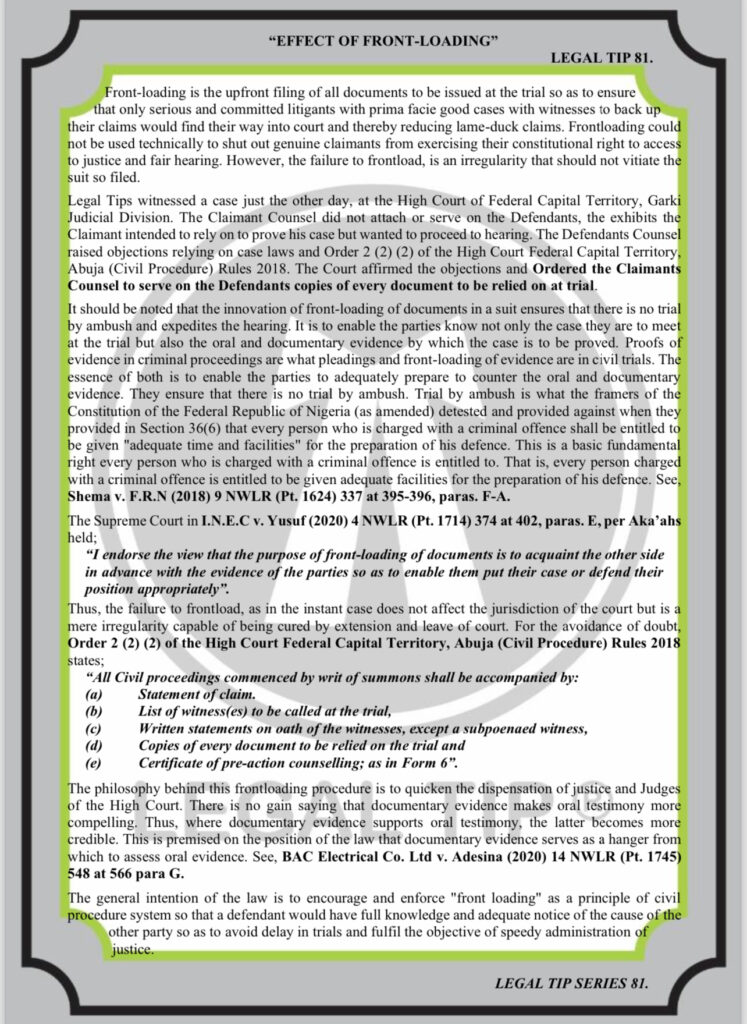
Front-loading is the upfront filing of all documents to be issued at the trial so as to ensure that only serious and committed litigants with prima facie good cases with witnesses to back up
their claims would find their way into court and thereby reducing lame-duck claims. Frontloading could not be used technically to shut out genuine claimants from exercising their constitutional right to access to justice and fair hearing. However, the failure to frontload, is an irregularity that should not vitiate the suit so filed.
Legal Tips witnessed a case just the other day, at the High Court of Federal Capital Territory, Garki Judicial Division. The Claimant Counsel did not attach or serve on the Defendants, the exhibits the Claimant intends to rely on to prove his case but wanted to proceed to hearing. The Defendants Counsel raised objections relying on case laws and Order 2 (2) (2) of the High Court Federal Capital Territory, Abuja (Civil Procedure) Rules 2018. The Court affirmed the objections and Ordered the Claimants Counsel to serve on the Defendants copies of every document to be relied on at trial. 
It should be noted that the innovation of front-loading of documents in a suit ensures that there is no trial by ambush and expedite the hearing. It is to enable the parties know not only the case they are to meet at the trial but also the oral and documentary evidence by which the case is to be proved. Proofs of evidence in criminal proceedings are what pleadings and front-loading of evidence are in civil trials. The essence of both is to enable the parties to adequately prepare to counter the oral and documentary evidence. They ensure that there is no trial by ambush. Trial by ambush is what the framers of the Constitution of the Federal Republic of Nigeria (as amended) detested and provided against when they provided in Section 36(6) that every person who is charged with a criminal offence shall be entitled to be given “adequate time and facilities” for the preparation of his defence. This is a basic fundamental right every person who is charged with a criminal offence is entitled to. That is, every person charged with a criminal offence is entitled to be given adequate facilities for the preparation of his defence. See, Shema v. F.R.N (2018) 9 NWLR (Pt. 1624) 337 at 395-396, paras. F-A.
The Supreme Court in I.N.E.C v. Yusuf (2020) 4 NWLR (Pt. 1714) 374 at 402, paras. E, per Aka’ahs held;
“I endorse the view that the purpose of front-loading of documents is to acquaint the other side in advance with the evidence of the parties so as to enable them put their case or defend their position appropriately”.

Thus, the failure to frontload, as in the instant case does not affect the jurisdiction of the court but is a mere irregularity capable of being cured by extension and leave of court. For the avoidance of doubt, Order 2 (2) (2) of the High Court Federal Capital Territory, Abuja (Civil Procedure) Rules 2018 states;
“All Civil proceedings commenced by writ of summons shall be accompanied by:
(a) Statement of claim.
(b) List of witness(es) to be called at the trial,
(c) Written statements on oath of the witnesses, except a subpoenaed witness,
(d) Copies of every document to be relied on the trial and
(e) Certificate of pre-action counselling; as in Form 6”.
The philosophy behind this frontloading procedure is to quicken the dispensation of justice and Judges of the High Court. There is no gain saying that documentary evidence makes oral testimony more compelling. Thus, where documentary evidence supports oral testimony, the latter becomes more credible. This is premised on the position of the law that documentary evidence serves as a hanger from which to assess oral evidence. See, BAC Electrical Co. Ltd v. Adesina (2020) 14 NWLR (Pt. 1745) 548 at 566 para G.
The general intention of the law is to encourage and enforce “front loading” as a principle of civil procedure system so that a defendant would have full knowledge and adequate notice of the cause of the other party so as to avoid delay in trials and fulfil the objective of speedy administration of justice.
LEGAL TIP SERIES 81.
About the Author
Chinelo Audrey Ofoegbunam is a dynamic, ingenious, noble, and vibrant advocate. An innovative business advanced expert who has undertaken relevant training in law and advocacy, business administration, governance, arbitration, leadership, and a host of others.
She focuses on the effective implementation of evidenced result-oriented paths, cases, fulfilled clients, and exceeds expectations. She is a generous, dedicated, and compassionate person, and indeed an advocate for justice and peace.
She has received several awards, medals of excellence, and honorary Awards for humanitarian acts. She was the best graduating student from the Chartered Institute of Arbitration (United Kingdom) in 2019, which caused her direct appointment in the Federal High Court-Alternative Dispute Resolution Centre.
Audrey is a member of several organizations to wit:
The St Vincent de Paul Society, Executive member of the Women and Girl-Child Capabilities Enhancement and Empowerment Organization (WGCCEEO), Devatop Center for Africa Development (DCAD), Nigerian Red Cross Society (NRCS), French Club Le Clezio; Young African Leadership Institute; The Nigerian Bar Association where she currently serves in an executive position as the Treasurer of the NBA Abuja Branch; The African Bar Association, Commonwealth Lawyers Association, and International Bar Association; The Nigerian Institute of Chartered Arbitrators, Chartered Institute of Arbitrators (UK), Federacion Internacional de Abogadas(FIDA); Institute of Mediation and Conciliation; Chartered Institute of Taxation, Institute of Chartered Secretaries and Administrators in Nigeria; Institute of ADR Registrars; Registrar, The Colloquium; and of the Rotary International.
Audrey is a Young African Leadership Institute Fellow, a Paul Harris Fellow, a Benefactor, an ADR Neutral, Federal High Court-Alternative Dispute Resolution Centre, and an Author of the weekly Legal Tip Series.
She speaks English, Igbo, and French; And loves playing badminton, listening to music, researching and writing, traveling, and swimming.
